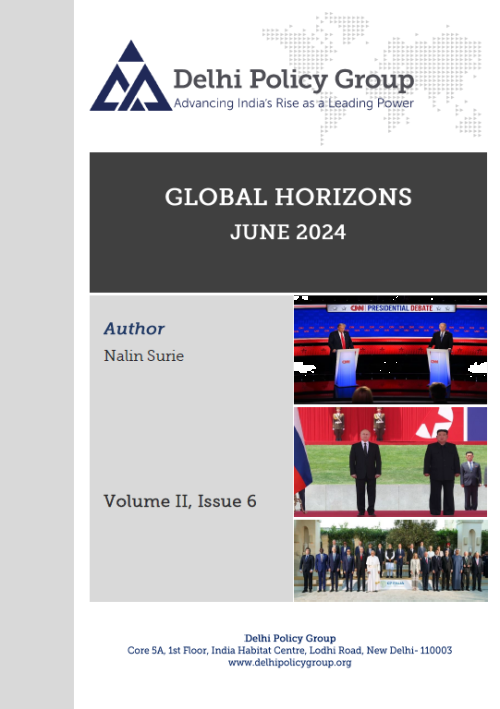Global Horizons
Date: July 04, 2024
In this issue, the author draws attention to a series of developments during the month of June that had the cumulative impact of drawing attention away from the bloody conflicts in Europe and in Gaza.
These included the gains made by far right parties in elections to the European Parliament; the decision of French President Macron to announce snap parliamentary elections whose outcome remained uncertain; the G7 Summit held in Apulia, Italy on June 13-14; Russian President Putin’s substantive visits to the DPRK and Vietnam on June 19-20; and US President Biden’s weak performance in his first televised debate with his Republican rival Trump on June 27, which caused an uproar in US political circles and created uncertainties for US allies and adversaries alike going forward.
At their summit, the G7 nations vowed to “support more effective, inclusive and equitable governance that reflects our changing world”, and to strengthen international rules and norms for the benefit of all, but their unilateralist actions were not quite consistent with this intent. The G7 also underlined a desire to seek constructive and stable relations with China, but expressed concern about China’s non-market policies and support for Russian in the war in Ukraine.
The jousting of the G7 with the Russia-China axis is likely to continue, with major implications for Eurasian security.
The “peace summit” called by Kiev was hosted by Switzerland on June 15-16, but only made it clear that the West does not have the unstinted support of the international community for its position on the war in Ukraine. President Putin called on Western powers to take a level-headed approach to his terms for peace, if there is real interest in ending the conflict in the heart of Europe.
Russia’s strategic outreach in Asia signalled a desire to re-establish old partnerships from the time of the Former Soviet Union, and sent signals to the US and its allies and to China alike.
Bloodshed in Gaza persisted as Israel continued to push its military campaign, refusing to budge under US pressure and persuasion. The danger of a wider conflict with Hezbollah grew.
The EU moved to appoint new incumbents to its high offices. NATO announced that its next Secretary General will be Mark Rutte, the PM of the Netherlands.
In South Africa, a new government of national unity took office, while Kenya was rocked by mass protests that compelled its government to withdraw IMF inspired tax proposals.
Finally, PM Narendra Modi was sworn in for a third term at the head of a coalition government. There was no change in the incumbents of key Cabinet portfolios of defence, foreign affairs, home and finance.
PM Modi attended the G7 outreach summit in Italy on June 14, underlining India’s “responsibility to place the priorities and concerns of the countries of the Global South on the world stage”. India will need to deliver on this promise.
To read this Global Horizons, Vol. II, Issue 6, please see the PDF attached.
These included the gains made by far right parties in elections to the European Parliament; the decision of French President Macron to announce snap parliamentary elections whose outcome remained uncertain; the G7 Summit held in Apulia, Italy on June 13-14; Russian President Putin’s substantive visits to the DPRK and Vietnam on June 19-20; and US President Biden’s weak performance in his first televised debate with his Republican rival Trump on June 27, which caused an uproar in US political circles and created uncertainties for US allies and adversaries alike going forward.
At their summit, the G7 nations vowed to “support more effective, inclusive and equitable governance that reflects our changing world”, and to strengthen international rules and norms for the benefit of all, but their unilateralist actions were not quite consistent with this intent. The G7 also underlined a desire to seek constructive and stable relations with China, but expressed concern about China’s non-market policies and support for Russian in the war in Ukraine.
The jousting of the G7 with the Russia-China axis is likely to continue, with major implications for Eurasian security.
The “peace summit” called by Kiev was hosted by Switzerland on June 15-16, but only made it clear that the West does not have the unstinted support of the international community for its position on the war in Ukraine. President Putin called on Western powers to take a level-headed approach to his terms for peace, if there is real interest in ending the conflict in the heart of Europe.
Russia’s strategic outreach in Asia signalled a desire to re-establish old partnerships from the time of the Former Soviet Union, and sent signals to the US and its allies and to China alike.
Bloodshed in Gaza persisted as Israel continued to push its military campaign, refusing to budge under US pressure and persuasion. The danger of a wider conflict with Hezbollah grew.
The EU moved to appoint new incumbents to its high offices. NATO announced that its next Secretary General will be Mark Rutte, the PM of the Netherlands.
In South Africa, a new government of national unity took office, while Kenya was rocked by mass protests that compelled its government to withdraw IMF inspired tax proposals.
Finally, PM Narendra Modi was sworn in for a third term at the head of a coalition government. There was no change in the incumbents of key Cabinet portfolios of defence, foreign affairs, home and finance.
PM Modi attended the G7 outreach summit in Italy on June 14, underlining India’s “responsibility to place the priorities and concerns of the countries of the Global South on the world stage”. India will need to deliver on this promise.
To read this Global Horizons, Vol. II, Issue 6, please see the PDF attached.



